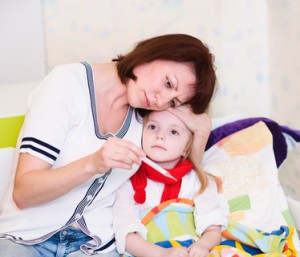
Snotty noses, rashes, runny poos & more… keep me home or send me to care?
Babies (particularly those who have just started daycare or have older siblings who share germs) get sick reasonably frequently. For example, it is normal for healthy young children to have at least 6-8 colds per year (usually more if in daycare). When you factor in that even when they seem recovered & better in themselves, the snotty nose or irritating cough can go on for longer it often seems they are always “sick”. It can be difficult to know when you need to keep them at home and/or see a doctor – as a general rule if you’re thinking you may have to keep them at home, then you are probably right! Likewise, if you wonder if you should see a doctor, you probably should!
Daycare & babies
Although it may be inconvenient when you have to work (and pay for daycare), keeping unwell children home is important. Sick children are excluded for daycare for two (very good) reasons:
1. To prevent spread of their infection to other kids
2. To look after them and allow them to rest/recover.
For many illnesses there are no hard and fast rules as to how long to exclude for. Some illnesses like chicken pox have well-defined exclusion periods – this is an excellent resource.
A few tips and guidelines for some common scenarios:
Colds and minor respiratory illnesses:
This can be a bit confusing as often children recover from the acute phase and have persisting runny nose or dry coughs (sometimes for weeks after & are usually not contagious at this point). Remember that most of these viruses are contagious from respiratory secretions – so if they are really snotty & coughing/spluttering everywhere and/or not well in themselves it is best to keep them home. If you are unsure see your GP.
Ear infections:
In themselves are not infectious although often there is an accompanying cold/virus that may be. If your child is having fevers and/or is unwell/in pain obviously they need to be at home.
Diarrhoea and vomiting:
They should be at home while vomiting/diarrhoea persists. Once there has been no diarrhoea for 24 hours they are usually ok to go back.
Rashes:
This is another difficult one as rashes are not always infective. Often they are allergic/eczema, drug reactions or even bites. If in doubt, again doctors can often assess the likely cause based on the history and appearance of the rash.
School sores (impetigo):
This is very contagious (by touching the sores). Kids should be excluded until they have had at least 24 hours of antibiotics and it is a good idea to cover exposed sores to prevent contact.
Hand-foot-mouth:
Another common daycare rash. Kids should be excluded until they are all dried and crusted over. This is usually about 5-10 days.
Gunky eyes/conjunctivitis:
Again, this is not always contagious. In babies, gunky eyes can be due to blocked tear ducts. This is not infection & thus is not contagious. Viral or bacterial conjunctivitis on the other hand is very contagious. Usually with these, the whites of the eyes look quite pink or red and/or there is gunky discharge. Kids need to be excluded until the discharge has cleared if an infective cause is to blame.
Headlice:
As long as kids have had appropriate treatment prior to coming to daycare they do not need to be excluded.
Fever:
This is often accompanied by other symptoms, but regardless kids should be kept home until well and the temperature has settled. It is worth seeing your doctor to check for the underlying cause of the fever. (Note anything under 37.5 is not a fever).
“Just not themselves”/lethargic/pale:
If your gut tells you something is not right, then you’re probably on the money. It’s best to keep them home, observe them and take them to your GP if you are worried.
So, when to see a doctor?
There is no right answer to this question – the most important thing is to listen to your gut. No one knows your child better than you do. A lot of people like some “guidelines” so here are some things that should prompt a doctor review (not an exhaustive list):
- Unusually lethargic/drowsy or floppy
- Seizure/convulsion
- A rash that does not blanch (fade away when you press it) or that looks like a purple/red bruise
- Reduced wet nappies –as a guide less than four in 24 hours or particularly strong smelling urine
- Vomiting frequently
- Won’t drink fluids
- Difficulty breathing
- If when your child is relaxed and you can see in between/under their ribs sucking in & out that means they are working hard to breathe
- If you can see their windpipe tugging down as they breathe
- In little babies if their nostrils seem to be flaring
- If they seem to be breathing very quickly
- Fever – there is no one temperature that means you need review but in babies less than three months ANY fever (over 37.6) should be reviewed by a doctor. If people really want a “number” I often say over 38.5 to see your doctor although, again trust your gut – children can be very sick with lower temperatures (and conversely, fine with higher ones)
As you can see, none of this is really black & white, but it is always best to err on the side of caution with a sick child and keep them home so you can watch them & let them take it easy. Don’t feel silly taking your child to the doctor if you are unsure (and yes 90% of them do “perk up” for the doctor (my own 12m old included!) I don’t think you can overreact when it comes to your child’s health. Most doctors are more than happy to see “well” sick children (lets face it, it is much easier for us than a “sick” sick child) and it’s a good chance for some education/tips on what to look for (and when to come back) during the illness so you can feel a bit more confident monitoring your child at home.
Resources:
QLD Health Time Out PosterSA Government Staying Healthy In Childcare
Raising Children.













